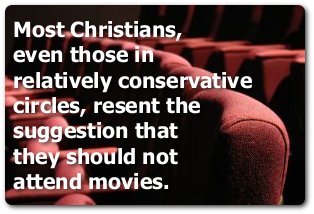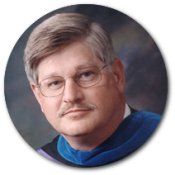Fundamentalists and Theater: Act One, Whatever Happened?

My parents came to Christ when I was about three or four years old. They responded to the witness of a home missionary who was planting a fundamental Baptist church in their small Michigan town. After they were baptized and joined that church, they brought up their children under the sound of its teaching.
 In those days, fundamentalist churches almost universally recognized a ban on theater attendance. No real distinction was made between the stage and the screen, though stage productions were not very accessible to most people. Typically, this prohibition was understood in simple terms: “Christians don’t go to movies.”
In those days, fundamentalist churches almost universally recognized a ban on theater attendance. No real distinction was made between the stage and the screen, though stage productions were not very accessible to most people. Typically, this prohibition was understood in simple terms: “Christians don’t go to movies.”
That has changed. For the present generation of young fundamentalists, theater attendance is probably more fundamental than daily devotions. Most Christians, even those in relatively conservative circles, resent the suggestion that they should not attend movies. They are likely to bristle about what they call legalism, and they pride themselves upon the refinement of their spiritual discernment for the selection of theatrical amusements.
The fundamentalist prohibition of theater was nothing new. In fact, it was the historic conviction of most of professing Christianity from the time of the church fathers until the latter half of the Twentieth Century. There were exceptions, of course: the miracle and passion plays were sometimes thought to be ways of communicating Christian truth. These exceptions, however, were pretty rare. Christian voices from Tertullian to Tozer objected to Christian participation in theater. Thinkers like Augustine and Pascal critiqued it specifically.
Fundamentalists were not the greatest defenders of this prohibition, at least partly because they never thought (until it was too late) that it required defending. They simply inherited a prejudice against theater. This prejudice was reinforced by the moral corrosion that they witnessed in the professional movie industry from its very early years.
Subsequently, however, fundamentalists have altered radically in their approach to theater. The stages in this transition are fairly easy to trace. They involve influences both external and internal to fundamentalism.
Externally, the barriers began to break down with the widespread availability of television during the late 1950s and early 1960s. What nobody anticipated was that television would become a little theater in every home. True, there were differences between the TV and the movie house, and even more differences between the television and the stage. Some attempt was made to keep television free from the indecency that was already acknowledged as an unavoidable product of Hollywood and Broadway. But the differences were matters of degree, not of kind.
A major turning point came in 1965 with the release of The Sound of Music. Starring Julie Andrews and Christopher Plummer, the film featured lush footage of the Austrian Alps, a remarkable score from Rodgers and Hammerstein, and a romantic plot that was all the more captivating because it was true. The Sound of Music was a movie that everybody wanted to see—including fundamentalists. This film probably did more than anything else to create a sense that the prohibition against theater was depriving Christians of something desirable. Once the sense of desire was aroused, there was no turning back.
The final step toward discarding the old prohibition arrived during the 1970s with the invention of the video cassette recorder and the widespread availability of cable movie channels. These technologies finally demolished the distinction between what could be seen in the theater and what could be seen on television. Fundamentalists could now indulge (privately) in the pleasures that they had been denied. I can still remember one of my professors at Trinity Evangelical Divinity School commenting during the late 1980s, “You can always tell who the fundamentalists are at ETS. They’re the ones with red eyes from staying up watching HBO so they can catch up on all the stuff they can’t go to the theater to see.” A bit wry, perhaps, but I suspect it was more true than not. Once things had gone that far, little point remained in continuing to prohibit publicly what so many were enjoying privately.
These external influences were reinforced by a growing fundamentalist fascination with the production of theater and cinema. Billy Graham, who was still a fundamentalist at the time, had launched evangelical film‐making with the production of Mr. Texas in 1951. At about the same time, Ken Anderson started producing Christian movies from Muskegon, Michigan. Christian films were typically shown in churches to audiences that were mostly Christian, but that changed in the early 1970s. The result of a collaboration between Russell Doughton and Donald Thompson, Thief in the Night, was meant to be shown outside of the church building, typically in a rented auditorium or theater. It also featured the music of Larry Norman, the so‐called “grand‐daddy of Christian rock.” By the late 1970s, Billy Graham was intentionally producing movies to be shown in commercial theaters.
Within fundamentalism, the repudiation of the repudiation of theater was led by Bob Jones University. The second president of that university prided himself on being an accomplished Shakespearian actor. As early as the 1950s he established a film company as part of the university’s fine arts department, sending Katherine Stenholm to receive personal instruction in cinema from Hollywood specialists such as Rudolph Sternad. Wine of Morning, a historical drama, was even sent to the Cannes Film Festival. In the face of such significant production for both stage and screen, Bob Jones loyalists obviously could not register any objection against theater per se. In order to maintain the prohibition upon going to movies, the historical objections of the church to theater had to be set aside in favor of objections to the content of some theatrical productions.
This shift in argument is what ended up demolishing the prejudice against theater. Most of the other arguments against movies depended on the argument against content. The arguments went something like this: theaters were worldly places because of the contents of the movies that were sometimes shown in them; one should not attend a “clean” movie because of the risk of seeing a trailer for a “worldly” movie; a neighbor who saw you coming out of a theater would not know what you had been watching; no one would want to be caught in a theater if the Rapture occurred. People were puzzled, however, as to why a film that could be acceptable at home could not be acceptable in a movie house. It was also unclear why a technology such as cinema could be sacred when produced badly for churches but irretrievably worldly when produced well for everyday amusement. For a while, some fundamentalists even maintained a semantic distinction between “movies,” which were produced by Hollywood and shown in theaters, and “films,” which were produced by Christians and shown in churches. Such double vision could not be tolerated indefinitely, and after the middle of the 1980s, the prohibition against theater came crashing down like a badly installed ceiling.
Today, it is uncommon to find a fundamentalist who objects even to the commercial theater, let alone one who objects to theater as a medium. The change has come silently. Rather than talking or arguing about it, most fundamentalists have simply altered their practice. Has this been for good or for bad? Why should we care at all? Perhaps I can suggest some answers to these questions in the next essay.
Thou Hidden Source of Calm Repose.
Charles Wesley (1707‐1788)
Thou hidden Source of calm repose,
Thou all‐sufficient Love Divine,
My help and refuge from my foes,
Secure I am, if Thou art mine;
And lo! from sin, and grief, and shame,
I hide me, Jesus, in Thy Name.
Thy mighty Name salvation is,
And keeps my happy soul above;
Comfort it brings, and power, and peace,
And joy, and everlasting love;
To me, with Thy dear Name, are given
Pardon, and holiness, and heaven.
Jesus, my all in all Thou art;
My rest in toil, my ease in pain,
The medicine of my broken heart;
In war my peace, in loss my gain,
My smile beneath the tyrantʹs frown,
In shame my glory and my crown:
In want my plentiful supply,
In weakness my almighty power;
In bonds my perfect liberty,
My light in Satanʹs darkest hour;
My joy in grief, my shield in strife,
In death my everlasting life. –––––-
–––––-
This essay is by Kevin T. Bauder, president of Central Baptist Theological Seminary. Not every one of the professors, students, or alumni of Central Seminary necessarily agrees with every opinion that it expresses.
- 118 views


Discussion